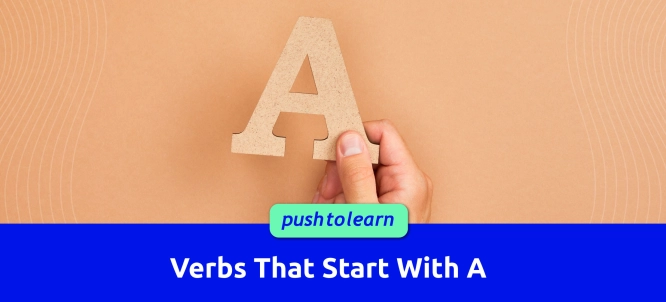by PushtoLearn
Verbs That Start With A
Table of Contents
Verbs That Start With A Exercises and Flashcards
These exercises focus on Verbs That Start With A
List of Top 50 Commonly Used Verbs that Start with A
|
Verb |
Definition |
Example |
|
Accept |
To agree to receive or take something |
"I accept your invitation to the party." |
|
Achieve |
To reach a goal or result |
"She achieved her dream of becoming a doctor." |
|
Act |
To do something or take action |
"The government must act to solve the crisis." |
|
Adapt |
To adjust to new conditions |
"Animals adapt to their environments over time." |
|
Address |
To deal with or talk about something |
"We need to address this issue immediately." |
|
Adjust |
To make slight changes to improve or correct |
"Adjust your seat for better comfort." |
|
Admire |
To regard someone or something with respect |
"I admire her dedication to her work." |
|
Admit |
To confess to something |
"He admitted his mistake to the teacher." |
|
Adopt |
To take up or accept something as one’s own |
"They decided to adopt a child." |
|
Advise |
To offer guidance or suggestions |
"I advise you to take an umbrella today." |
|
Affect |
To influence or make an impact |
"The weather can affect your mood." |
|
Agree |
To have the same opinion as someone else |
"I agree with your plan." |
|
Aim |
To direct a course toward a target |
"We aim to finish the project by Friday." |
|
Allocate |
To distribute resources for a specific purpose |
"The funds were allocated for education." |
|
Analyze |
To examine in detail for understanding |
"He analyzed the data thoroughly." |
|
Announce |
To make something publicly known |
"The company announced a new product launch." |
|
Answer |
To respond to a question or situation |
"She answered all the exam questions correctly." |
|
Appear |
To come into sight or become visible |
"A rainbow appeared after the rain." |
|
Apply |
To make use of or request formally |
"She applied for a job at the firm." |
|
Appreciate |
To value or be thankful for something |
"I appreciate your help with the project." |
|
Approach |
To move closer to something or someone |
"We approached the manager with our concerns." |
|
Arrange |
To organize or put in order |
"She arranged the chairs in a circle." |
|
Ask |
To inquire or request |
"He asked for directions to the park." |
|
Aspire |
To strive toward an ambition |
"She aspires to become a great musician." |
|
Assess |
To evaluate or estimate |
"We need to assess the situation carefully." |
|
Assign |
To designate a task or role |
"The teacher assigned homework to the class." |
|
Assume |
To take for granted without proof |
"He assumed she was running late." |
|
Attend |
To be present at an event |
"They attended the wedding ceremony." |
|
Attract |
To draw or pull toward |
"The museum attracts thousands of visitors annually." |
|
Avoid |
To keep away from or evade |
"He avoids talking about his personal life." |
|
Award |
To give a prize or recognition |
"She was awarded a scholarship for her achievements." |
|
Amplify |
To increase in size, volume, or significance |
"They amplified the sound for the concert." |
|
Ascend |
To move upward or rise |
"The balloon ascended into the sky." |
|
Assemble |
To gather or bring together |
"The workers assembled in the meeting room." |
|
Assert |
To state confidently or forcefully |
"She asserted her right to speak freely." |
|
Assist |
To help or support |
"I assisted him with his homework." |
|
Associate |
To connect or relate to something |
"I associate summer with vacations." |
|
Alter |
To change or modify |
"The tailor altered the dress to fit her." |
|
Apologize |
To express regret for a mistake |
"He apologized for being late." |
|
Accomplish |
To complete successfully |
"We accomplished all our goals for the year." |
|
Arrange |
To organize or prepare |
"I will arrange a meeting for tomorrow." |
|
Admire |
To look at with pleasure |
"He admired the view from the top of the hill." |
|
Actuate |
To put into action or motion |
"The lever actuated the machine." |
|
Acquire |
To gain or obtain something |
"He acquired a taste for jazz music." |
|
Align |
To place in a straight line |
"They aligned the project goals with the company vision." |
|
Annoy |
To irritate or disturb |
"The loud music annoyed the neighbors." |
|
Argue |
To exchange opposing views |
"They argued about the best route to take." |
|
Ascertain |
To find out or make certain |
"She ascertained the facts before making a decision." |
|
Assist |
To help or aid |
"The nurse assisted the doctor during the surgery." |

Featured Verbs Grouped by Topics
Communication
-
Announce
Definition: To make something known to a group or publicly.
Interesting Details: This verb is often associated with formal contexts, such as media updates or public speeches. It's also a critical word in workplace communication.
Synonyms: Declare, Proclaim, Broadcast.
Example: "The CEO announced the company's plans for expansion." -
Advise
Definition: To give recommendations or guidance.
Interesting Details: "Advise" is often paired with prepositions like "on" or "about." It’s commonly used in legal, financial, or academic settings.
Synonyms: Counsel, Recommend, Suggest.
Example: "The teacher advised the students on their projects." -
Answer
Definition: To respond to a question or situation.
Interesting Details: "Answer" is versatile and can be used for verbal, written, or non-verbal communication.
Synonyms: Reply, Respond, Retort.
Example: "She answered all the interview questions confidently."
Travel and Movement
-
Ascend
Definition: To move upward or rise.
Interesting Details: Often used in physical or metaphorical contexts, such as ascending a mountain or achieving a higher status.
Synonyms: Climb, Rise, Elevate.
Example: "The hikers ascended the steep trail to the summit." -
Approach
Definition: To move closer to something or someone.
Interesting Details: This verb also applies to abstract concepts, such as "approaching a problem."
Synonyms: Advance, Come near, Move toward.
Example: "The train is approaching the station."
Problem-Solving
-
Analyze
Definition: To examine in detail for understanding or to draw conclusions.
Interesting Details: A fundamental verb in academic and professional fields, particularly in science, mathematics, and data analysis.
Synonyms: Examine, Evaluate, Investigate.
Example: "The scientist analyzed the results of the experiment." -
Assess
Definition: To evaluate or estimate the value, importance, or quality of something.
Interesting Details: Common in business and education contexts, such as assessing employee performance or student progress.
Synonyms: Appraise, Judge, Evaluate.
Example: "The manager assessed the team's overall performance during the project."
Social and Emotional Interactions
-
Admire
Definition: To regard someone or something with respect or pleasure.
Interesting Details: Often used to express deep appreciation for someone’s qualities, achievements, or appearance.
Synonyms: Respect, Adore, Look up to.
Example: "Many people admire her dedication to the environment." -
Apologize
Definition: To express regret for a mistake or wrongdoing.
Interesting Details: This verb is culturally significant, as the way and frequency of apologizing vary across societies.
Synonyms: Express remorse, Say sorry, Regret.
Example: "He apologized for being late to the meeting."
Everyday Use of Verbs Starting with A
Verbs that start with "A" are extremely versatile and frequently appear in everyday speech and writing. Here’s how they are commonly used:
-
Accept
-
Example in daily life: "I accept your invitation to the wedding."
-
This verb is commonly used when agreeing to proposals, offers, or conditions.
-
Ask
-
Example in daily life: "Can you ask them to turn down the music?"
-
A highly practical verb for making inquiries, requests, or commands.
-
Agree
-
Example in daily life: "We all agreed to meet at the park."
-
Essential for indicating consensus or shared opinions.
-
Apply
-
Example in daily life: "She applied for a new job yesterday."
-
Frequently used in formal settings like job applications or legal requests.
-
Avoid
-
Example in daily life: "I avoid driving during rush hour."
-
A useful verb for talking about steering clear of unwanted situations or actions.
-
Admire
-
Example in daily life: "I really admire how patient you are with kids."
-
A great verb to compliment someone’s traits or actions.
-
Announce
-
Example in daily life: "The teacher announced the results of the test."
-
Commonly used for sharing information in public or semi-public contexts.
Common Mistakes
-
Confusing “Affect” and “Effect”
-
Mistake: “The weather effected my mood.”
-
Correction: “The weather affected my mood.”
-
Using “Advise” Instead of “Advice”
-
Mistake: “Can you give me some advise?”
-
Correction: “Can you give me some advice?”
-
Misusing “Adapt” and “Adopt”
-
Mistake: “We adopted our methods to the new technology.”
-
Correction: “We adapted our methods to the new technology.”
FAQ
What’s the difference between “Adapt” and “Adopt”?
-
Adapt means to adjust to new conditions (e.g., "Animals adapt to their surroundings.")
-
Adopt means to take something as your own (e.g., "They adopted a new strategy.").
How do I use "Advise" and "Advice" correctly?
-
Advise is a verb (e.g., "I advise you to take an umbrella.")
-
Advice is a noun (e.g., "She gave me good advice.").
Can “Affect” and “Effect” be verbs?
-
Affect is primarily a verb meaning "to influence" (e.g., "The rain affected our plans.")
-
Effect is mostly a noun meaning "a result" (e.g., "The effect of the policy was significant.").
-
However, effect can also be used as a verb meaning "to bring about" in formal contexts (e.g., "The manager effected change quickly.").
Are there synonyms for “Apply” in different contexts?
-
Yes, depending on the context:
-
Request: "Submit," "Petition."
-
Use: "Utilize," "Employ."
-
Spread: "Administer," "Put on."
How can I remember verbs starting with "A" for professional use?
Focus on commonly used ones like Analyze, Assess, Allocate, and Advise. Pair them with specific professional scenarios, such as project management or communication.
Explore other Verbs:

